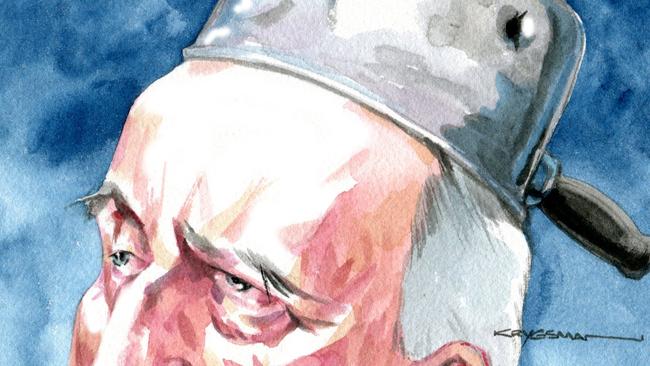
Paul Keating is at his least appealing when he strays into the history war, a topic he approaches with the intellectual rigour of rottweiler with a diploma in postcolonial studies.
In 2013 he chose Remembrance Day, an occasion to honour the courage of our forebears, to tell us that their sacrifice in World War I was pointless. The Diggers were mere “cannon fodder” in “a war devoid of any virtue”, driven by “the whim of so-called statesmen”.
“We had no need to reaffirm our European heritage at the price of being dragged to a European holocaust,” he said.
The holocaust came later, of course, being the term exclusively applied to Nazi genocide, chiefly of Jews. For Keating, one suspects, that is pedantry, the term he uses to deride anyone who dares to draw attention to his inconsistencies, not just with the facts but with himself.
Keating, the World War I defeatist, presents himself as a World War II hawk in a column in The Weekend Australian, deriding Robert Menzies, whom he accuses of cowardice in office.
It is a rash assertion, given the evidence to the contrary. Menzies, in words and deed, never doubted that Germany and Japan’s aggression must be resisted, and, unlike Keating, appreciated the scale of the challenge.
“No compromise, no partial victory will do,” he told a radio audience in 1942. “Germany and Japan, the arch law-breakers, the dark angels of fear, must be made to know the whole anguish of the war and learn the salutary lessons of defeat.”
That passage came in a broadcast in defence of freedom, a cause common to both world wars. Unlike Keating, Menzies believed German expeditions of power and glory on other people’s soil should be resisted, whether perpetrated by kaiser or fuhrer.
Menzies never wavered from the strategic judgment, self-evident to many, that the presence of British forces east of the Suez served Australia’s best interests. He believed it in 1941, while respecting Britain’s strategic requirement for naval tonnage in the Mediterranean and Atlantic, and he believed it in 1956, when he supported the flawed British and French expedition to secure the Suez Canal.
Keating believed it was Britain’s duty to protect its former colonies in the war, saying Britain’s inability to defend the Malay Peninsula was a stab in Australia’s back. Yet Menzies, he says, “dishonoured the country by his poorly judged support for the British over Suez”.
Treating World War II as a partisan battleground is dangerous for defenders of the Labor movement. For while the party’s political arm distinguished itself under John Curtin and Ben Chifley, its industrial arm sabotaged the war effort and almost certainly cost lives.
Hal Colebatch’s 2014 book, Australia’s Secret War, offers a counter-narrative to more familiar wartime stories of courage, brotherhood, and sacrifice. The Commonwealth Year Book, the Australian almanac of official statistics, records the number of workdays lost to strikes in the coal industry. In 1939, there were 291,067. In 1940, there were 1,371,382.
Colebatch quotes witnesses who describe P-38 twin-engine fighters being torn to pieces by unionised crane operators who lifted them from the hold without unbolting them from the floor.
Crates carrying Jeeps were deliberately dropped in the water. Troops from the Seventh Infantry Brigade landing at Milne Bay in New Guinea discovered that the capacitors had been removed from their radios. Soldiers unpacking radar equipment on Green Island in Papua New Guinea learned that the valves had been stolen by stevedores at Townsville.
The 1940 coal strikes, in the Colebatch’s view, “have a good claim to be the most treacherous event in Australian history”.
Colebatch’s evidence is considerably more persuasive than the selected documents Keating relies on to launch his unfounded attack on Menzies.
Keating, however, whether discussing war or peace, appears comfortable in his own prejudices. The shakier his assessment, the louder he shouts, until his invective becomes almost defeating.
Australia’s longest serving prime minister is, in Keating’s estimation, a woeful coward who “was by nature a political vagabond”.
It raises the question why Australians voted Menzies in as prime minister in 1949 and never voted him out, despite six invitations to do so. Keating has an answer, but not a very good one. In 1949, Menzies “scored off Ben Chifley’s bank nationalisation program to shoehorn his way back to office”.
By “shoehorn”, Keating means a 27-seat majority in a 121-member chamber, presumably.
The incompetency of Doc Evatt and internal division in an otherwise virtuous Labor Party is enough, in Keating’s book, to account for why the Australian people stupidly re-elected a “vacuous dandy” time and time again.
But then the Australian people have always been stupid in Keating’s books. They allowed themselves to be hoodwinked into fighting at Gallipoli and the fields of Flanders to defend “competing empires and territorial conquests” in support of “cultural imperialism tinged with racism”. They thought they were fighting for freedom. How stupid can you get?
Labor figures with greater minds and less bluster than Keating lately have been prepared to reassess Menzies’ prime ministership, recognising the sustained growth and social reform as the foundation of our prosperity.
John Howard, in his two-part documentary Howard on Menzies, discovered respect, albeit grudging, in the most unexpected places. Bob Hawke, Thomas Keneally, Michael Kirby and others had many positive things to say, just as Howard and others are prepared to acknowledge their opponents’ achievements.
Not so Keating, who was not interviewed for the program but whose recorded parliamentary anti-Menzies outburst appeared in an early section of the program as a historical vestige of the anti-Menzies prejudice that was rife among the political haters from whom Keating learned his art.
For Keating, like Carl von Clausewitz, war is the continuation of politics by other means.
Nick Cater is executive director of the Menzies Research Centre.



To join the conversation, please log in. Don't have an account? Register
Join the conversation, you are commenting as Logout